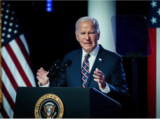By Glynn Wilson –
CUNNINGHAM FALLS BY CAMP DAVID, Md. — In an extraordinary revelation set to change the subject of the news away from President Donald Trump’s sharpie scandal over changing the track map for Hurricane Dorian to show a threat to Alabama, the president revealed Saturday that he had been planning a secret meeting this weekend with leaders of the Taliban at Camp David to end United States military involvement in Afghanistan.
“Unbeknownst to almost everyone,” Trump wrote in a series of Twitter tweets, Afghan president Ashraf Ghani and leaders of the fundamentalist Muslim sect the Taliban were allegedly headed this weekend to the presidential retreat at Camp David in the woods of Maryland for what would have been a politically explosive peace negotiation guaranteed to piss off Americans, leaders in Israel and others on the eve of the Sept. 11, 2001 attack anniversary.
Unbeknownst to almost everyone, the major Taliban leaders and, separately, the President of Afghanistan, were going to secretly meet with me at Camp David on Sunday. They were coming to the United States tonight.
— Donald J. Trump (@realDonaldTrump) September 7, 2019
But Trump said that “in order to build false leverage,” the Taliban had admitted to a suicide car bomb attack on Thursday that had killed an American soldier and 11 others in the capital of Kabul.
“I immediately cancelled the meeting and called off peace negotiations,” the president tweeted.
“If they cannot agree to a ceasefire during these very important peace talks, and would even kill 12 innocent people, then they probably don’t have the power to negotiate a meaningful agreement anyway,” Trump added. “How many more decades are they willing to fight?”
The president’s announcement was startling for multiple reasons, according to the New York Times.
“A surprise summit at Camp David with leaders of an insurgent group that has killed thousands of Americans since the October 2001 invasion of Afghanistan would have been a sensational diplomatic gambit, on par with Mr. Trump’s meetings with the once-reclusive North Korean leader, Kim Jong-un,” the Times writes in what appears to be an objective understatement. The fact that an American president would consider meeting with the Taliban at all — much less on American soil at Camp David — would not have gone down well in New York, Washington or Jerusalem.
“A senior administration official said the meeting had been planned for Monday, just two days before the anniversary of the Sept. 11, 2001, attacks, which were plotted from Afghanistan and led to the United States’ invasion of the country,” the Times wrote.
Trump’s announcement appears to at least temporarily cancel out his campaign promise to withdraw American troops from an 18-year conflict that he has called an “aimless boondoggle.”
It was known but not covered widely that the government in Afghanistan was involved in peace negotiations, but the Taliban had insisted on postponing an upcoming election before proceeding with negotiations while Ghani has been determined to go forward with the Sept. 28 election, which he is favored to win.
Several people familiar with the diplomacy between the Trump administration and the Taliban puzzled over Trump’s stated decision to cancel peace negotiations entirely in response to one American casualty, however tragic, according to the Times.
For one thing, the Taliban had not agreed to halt their attacks on Americans in advance of a formal agreement, raising the question of whether Trump “might have been looking for a pretext because the talks had run into trouble.”
Why would an American president even consider talks with the religious fundamentalists leading the Taliban at all, much less without an agreement to stop planning and carrying out attacks against Americans? This is absurd on the face of it, and would seem to violate long-standing U.S. policy of not negotiating with terrorists. The Taliban is considered a terrorist group, not a legitimate government. Perhaps Trump wants to meet the leaders of the Taliban because he agrees with their abhorrent treatment of women?
“The development is sure to inflame a Washington political debate about the talks that until now had largely played out in national security circles to little public fanfare,” the Times reports, again in a bit of an understatement.
“Trump had been coming under growing pressure from conservatives not to hastily exit the country while many leading Democrats have said they support peace talks leading to an American withdrawal.”
Many details of the scuttled Camp David meeting were unclear on Saturday night and Sunday morning.
A senior Trump administration official told the Times that the decision to cancel the meeting had been made on Thursday, but that Trump had delayed his announcement. On Friday, Afghan officials confirmed that Mr. Ghani postponed a planned meeting in Washington. One person familiar with the diplomacy said that the plan for a Taliban visit to Washington had not been under discussion until about a week ago. (Taliban representatives have not yet confirmed that they ever planned to attend such a meeting.)
It was also unclear whether Trump’s halt to the peace negotiations would be permanent. The president has reversed such decisions in short order before. In May 2018, he abruptly canceled his second summit with Mr. Kim, only to reschedule it days later. But several people familiar with the Afghan talks said on Saturday that it could be difficult to restart them, according to the Times.
The negotiations have been underway since last winter, when Trump’s special envoy for Afghanistan, Zalmay Khalilzad, began regular trips to Doha, Qatar, for grueling sessions with Taliban representatives. U.S. and foreign officials said that the talks had reached an advanced stage and, until Saturday night, that an agreement with the Pashtun insurgent group that once harbored the Qaeda mastermind Osama bin Laden was close at hand.
In nine rounds of negotiations, Mr. Khalilzad painstakingly worked toward what was described as a phased peace agreement — initially a deal between the United States and the Taliban that would open the door for direct negotiations between the Afghan sides, before all of it came together into a final Afghan peace deal.
Mr. Khalilzad had proposed drawing down American military troops in exchange for a partial cease-fire by the Taliban. In a recent interview with the Afghan channel ToloNews, he said 5,400 United States forces would leave Afghanistan within 135 days of a signed agreement.
Under that tentative deal, the number of American troops would have initially been reduced to about what it was when Trump took office in 2017.
As for the remaining 8,600 American forces, they would have left according to a gradual timeline, perhaps within 16 months.
That would have allowed Trump, who has been routinely critical of expensive American interventions in the Muslim world, to declare that he had ended a long and increasingly unpopular conflict, and to boast that he had achieved an outcome his predecessor, President Barack Obama, sought in vain.
Critics of the nascent agreement — including the former American commander in Afghanistan, the retired Army general, David H. Petraeus — had warned that it could lead to the return of Al Qaeda. Several invoked the cautionary example of Mr. Obama’s troop withdrawal from Iraq, which many national security experts blame for the 2014 emergence of the Islamic State in that country.
And in a Sept. 3 statement published by the Atlantic Council, nine former senior American diplomats with extensive experience in Afghanistan warned that a “major withdrawal of U.S. forces should follow, not come in advance of real peace agreement.” Anarchy in Afghanistan after a premature American exit “could prove catastrophic for U.S. national security” and would “underscore to potential enemies that the United States and its allies are not reliable,” the statement said.
Such critics have pointed to a recent wave of Taliban attacks as a sign that the insurgent group cannot set aside violence. The bombing cited by the president involved a car bomb detonated on Thursday at a checkpoint near the American Embassy in Kabul.
Afghan government officials who have been briefed on the negotiations privately said Mr. Khalilzad did not force enough concessions from the Taliban to ensure stability as the American military leaves Afghanistan.
One official told the Times the agreement between Mr. Khalilzad and the Taliban would not have assured national elections on Sept. 28, as Mr. Ghani has demanded. Rather than requiring a nationwide cease-fire, it calls for a reduction of violence in Kabul and Parwan. And, the Afghan government official said, it may allow the Taliban to continue referring to itself in official conduct as the “Islamic Emirate” — as it did when the extremist group was ruling Afghanistan with fear.
If anything, one Afghan official said speaking anonymously, the negotiations appear to have only emboldened the Taliban.
According to Dan Feldman, special representative for Afghanistan and Pakistan in the Obama administration, the question is what comes next in terms of strategic policy options?
“The two main ones seem to be either keeping the current troop footprint in Afghanistan for the foreseeable future, which Trump clearly doesn’t want to do, or start to draw down anyway, but thus without getting any concessions for it,” he said. “That seems like the worst possible result — withdrawing immediately and irresponsibly, leaving both a security and political vacuum.”














